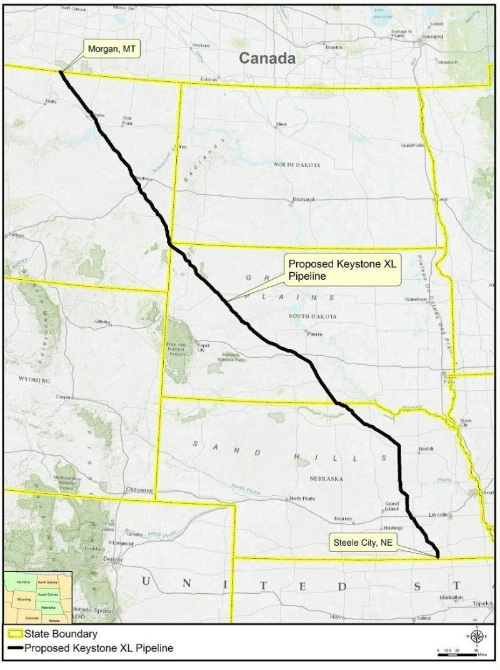
By Jorge Barrera, January 31, 2014. Source: APTN National News
A Native American alliance is forming to block construction of TransCanada’s proposed Keystone XL pipeline which still needs final approval from U.S. President Barack Obama after the State Department released an environmental report indicating the project wouldn’t have a significant impact Alberta tar sands production.
Members from the seven tribes of the Lakota Nation, along with tribal members and tribes in Idaho, Oklahoma, Montana, Nebraska and Oregon, have been preparing to stop construction of the 1,400 kilometre pipeline which is slated to run, on the U.S. side, from Morgan, Mon., to Steel City, Neb., and pump 830,000 barrels per day from Alberta’s tar sands. The pipeline would originate in Hardisty, Alta.
“It poses a threat to our sacred water and the product is coming from the tar sands and our tribes oppose the tar sands mining,” said Deborah White Plume, of the Oglala Sioux Tribe, which is part of the Lakota Nation in South Dakota. “All of our tribes have taken action to oppose the Keystone XL pipeline.”
The U.S. State Department released its long awaited environmental report on TransCanada’s proposed pipeline Friday. The report found that the pipeline’s operation would not have a major impact on Alberta tar sands production which is also at the mercy of market forces.
“Approval or denial of any one crude oil transport project, including the proposed project, is unlikely to significantly impact the rate of extraction in the oil sands or the continued demand for heavy crude oil at refineries in the United States based on expected oil prices, oil sand supply costs, transport costs and supply-demand scenarios,” said the report.
The project will now go into a final phase which focuses on whether Keystone XL “serves the national interest.” Pipeline’s environmental, cultural and economic impacts will be weighed in this phase and at least eight agencies will have input on the outcome, including the Department Defence, Justice, Interior, Commerce, Transportation, Energy, Homeland Security and the Environmental Protection Agency.
A 30-day public comment period will also be initiated on Feb. 5.
The State Department is also in the midst of probing conflict-of-interest allegations levelled against contractors who both worked on the report and for TransCanada.
The Lakota Nation is preparing for the eventuality the pipeline receives approval. The nation has led the formation of a project called “Shielding the People” to stop the pipeline. The Lakota also launched a “moccasins on the ground” program to train people in Indigenous communities to oppose the pipeline.
There are also plans to set up spiritual camps along the pipeline’s route. But when and where those camps will spring up remains a closely guarded secret.
“It will band all Lakota to live together and you can’t cross a living area if it’s occupied,” said Greg Grey Cloud, of the Rosebud Sioux Tribe. “If it does get approved we aim to stop it.”
Gary Dorr, from the Nez Perce Tribe in Idaho, was in Rosebud Friday for a meeting to discuss opposition to Keystone.
The Nez Perce tribe has already used its treaty rights to block the transport of so-called megaloads of mining equipment headed to Alberta’s tar sands through its territory. The tribe launched blockades and won a court battle to stop the shipments from traversing its lands.
“It will be obvious, it will be concrete, and I think once it starts and they start building you will start to see the momentum and the force of the tribal people…it is an epic project, it will have an epic response from the tribal people,” said Dorr. “The tar sands is already affecting the people (for Fort Chipewyan in Alberta), climate change is already obvious. To facilitate that is not something the Native people of the U.S. are going to do. We are not going to sit idly by and let it happen.”
The pipeline has been called the ‘black snake’ in reference to prophecies that had previously been linked to construction of highways and railways. In recent ceremonies, however, discussions sifting through the prophecies noted that the black snake goes under ground.
“That would be a referral to the pipeline,” said Dorr.
Paula Antoine, who works for the Rosebud Tribe’s land office, said while the pipeline does not cross any Lakota reservation lands, it comes close, sometimes metres away. Antoine said the pipeline, however, cuts through their treaty territory, sacred sites and waterways.
“They aren’t recognizing our treaties, they are violating our treaty rights and our boundaries by going through there,” said Antoine. “Any ground disturbance around that proposed line will affect us.”
The battle lines have already been drawn in tribal council chambers. The Oglala Sioux Tribe passed a resolution Friday banning TransCanada and former AFN national chief Phil Fontaine, who has been hired by the energy firm to deal with First Nations opposition to its Energy East project in Canada, from entering its territory.
The resolution received unanimous consent,said White Plume.
The Lakota, Dakota and Nakota make up the Lakota Nation. The nation includes the tribes of Rosebud, Oglala and the Cheyenne Indian reservation, the Yankton Sioux Tribe, Standing Rock, Flandreau Sioux Tribe and the Crow Creek Sioux Tribe.
